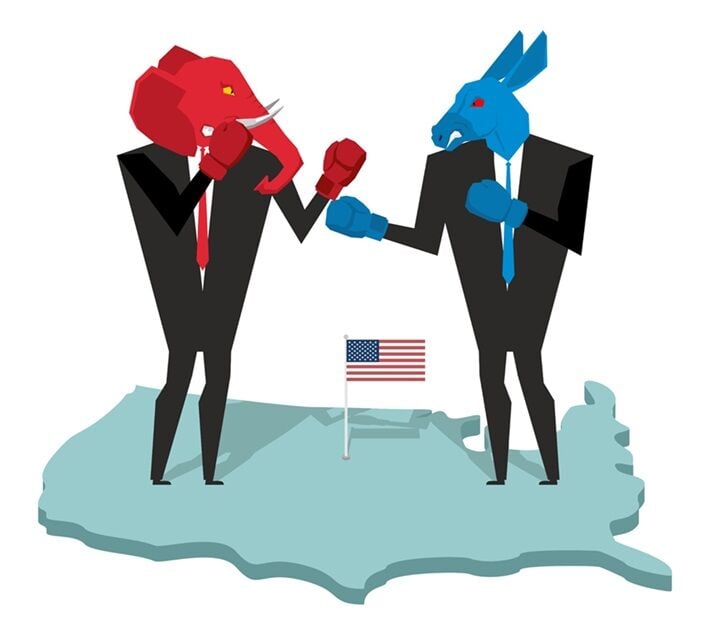For too long in America, there hasn’t been anyone to tell the emperors that they have (or had) no clothes.
Recently I read the book ““ by Jonathan Allen and Amie Parnes. It sheds light on former President Joe Biden’s mental and physical decline, and the way his inner circle hid it from the nation until he finally departed the race.
Also recently, my husband and I watched a chunk of our savings evaporate before our eyes after President Donald Trump launched his ‚ÄúLiberation Day‚ÄĚ tariffs.
Meanwhile, top national security officials were being fired after conspiracy theorist Laura Loomer advised Trump that they were not loyal enough. And individuals were being picked up here in the U.S. and sent to a prison in El Salvador without due process.
People are also reading…
All combined, it left me in the throes of anger.
The object of my ire was, while deserving, not directed at either president, but rather towards our political system and both two major political parties. Together, they have delivered us to this moment in our nation’s history.
To be clear, this is not an attempt at bothsiderism. Nor am I suggesting one party acted better or worse than the other. Both the Democratic and Republican parties are responsible for their failures and for having let the American people down in different but profound ways.
My hope here is that readers can think about recent events not through partisan lenses, but rather as non-tribal Americans who are able to recognize that we have a very big problem on our hands.
To look forward, we must reflect on a few of the events leading up to the 2024 election.
Many of the quotes that Allen and Parnes shared in their book were illuminating, but perhaps the most riveting and telling statement came from the authors themselves: ‚ÄúIn the end, Biden was, in fact, a bridge ‚ÄĒ from one Trump term to the next.‚ÄĚ
‚ÄúFight‚ÄĚ describes the collapse of the Biden campaign last year and the handoff to then-Vice President Kamala Harris. It includes some behind-the-scenes reporting from the Trump campaign, following the fateful presidential debate of June 27.
The authors wrote how donors complained, ‚ÄúThey‚Äôre telling us not to believe our lying eyes.‚ÄĚ Tut the ‚Äúthey‚ÄĚ could have been any of us Americans.
Allen and Parnes describe how the party faithful ‚Äúdid not want to admit that he (Biden) had deceived them ‚ÄĒ perhaps deceived himself ‚ÄĒ about his fitness to run.‚ÄĚ And that Biden had put ‚Äúego over party and country.‚ÄĚ
The Republicans are not without blemish here. The events of Jan. 6, 2021, should have disqualified Trump from ever leading the party again. But since Trump brought his party back to power in the presidency as well as both houses of Congress, that type of reflection is not likely to happen on the GOP’s part.
Fast forward to the events of the past few weeks, which prompted me to reread another book: ‚ÄúCorruptible: Who Gets Power and How it Changes Us,‚ÄĚ by Brian Klaas.
Klaas’ book attempts to answer four main questions: First, do worse people get power? Second, does power make people worse?
Third (and the question that will be the focus here), why do we let people control us who clearly have no business in control? And fourth, how can we ensure that incorruptible people get into power and wield it justly?
Some of the answers lie in the fact that we no longer have gatekeepers in the form of strong political parties.
For at least the past few decades, we have seen a weakening of our political parties as well as an increasingly feckless Congress, which has handed over nearly all of its power to the executive branch. In the way, for example, that this Republican-controlled Congress has completely handed its trade and tariff power over to Trump.
Members of Congress are so fearful of primary challenges (not to mention physical threats to their lives and to the lives of their families) that they willingly stand by instead of using the power that Article 1 of the Constitution gives them.
Neither party policed its own radical flanks. And because of our perverse primary election system and flawed incentives for elected officials, this is not likely to change soon.
There are very few issues that I agree on with former Chicago mayor and former White House Chief of Staff Rahm Emanuel. But he was spot-on when he told Chris Cillizza on Cillizza‚Äôs ‚ÄúSo What?‚ÄĚ Substack: ‚ÄúWe (Democrats) are weak, and we‚Äôre woke. And the American voters read us pretty well. Now I happen to think the other side‚Äôs vulnerability is they‚Äôre corrupt, and they betrayed you.‚ÄĚ
Our political parties have failed us as Americans. Fixing them or creating something new is a monumental task.
If and until that happens, the first party that will apologize, address its weaknesses and find people to tell the emperor he has no clothes may be the one to deliver us from this mess that we are in.









